News
Senior administrators predict shortage of locally produced rice
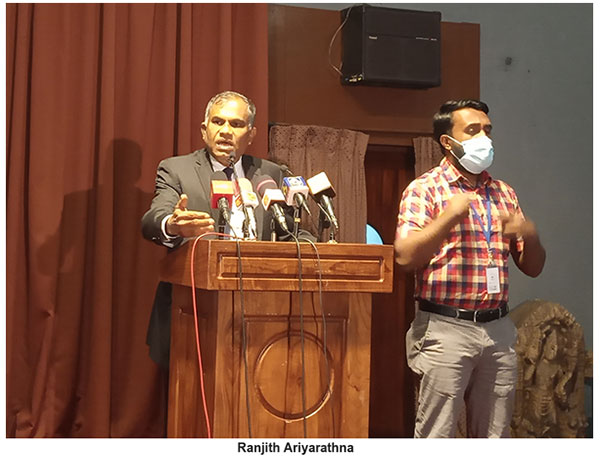
Text and picture by PRIYAN DE SILVA
The Sri Lanka Administrative Service Association (SLASA) has warned that there will be a severe shortage of locally produced rice during the next two cultivation seasons. The revelation was made by the Association’s Deputy President, Ranjith Ariyarathna, while presenting the SLASA’s proposals for economic and social resurgence of the nation at the Mahaweli Centre auditorium on Monday (18).
The Sri Lanka Administrative Service is made up of officials in the top echelons of Sri Lanka’s Public Service. As a union, the SLASA is capable of minimising corruption and bringing any corrupt government to its proper senses, it has claimed.
The SLASA believes that wrong economic, and financial policies and a number of administrative lapses are the root cause of the present crisis in Sri Lanka.
Ariyarathna pointed out that what the intellectuals proposed was a green agriculture policy but what the lawmakers stubbornly implemented was organic agriculture!
Ariyarathna pointed out that the annual consumption of rice per year in Sri Lanka was 240,000 MT but due to the government’s decision to ban the import of chemical fertiliser and pesticides there had been a 50% drop in production and in addition due to the losses suffered in the previous cultivation seasons the extent of land which would be cultivated with paddy would be around 50% to 60% of the arable land.
At current market price it would cost 250 million USD to import rice to meet the shortfall in the supply of it, Ariyaratne said, quoting figures obtained from the National Fertiliser Secretariat the nation’s annual requirement of chemical fertilisers were 545,983 tonnes of Urea, 163,928 tonnes of TSP and 317,743 tonnes of MOP.
The average cost of importing the above in the past was Rs. 55 billion and would be much more now, the association said.
The SLASA has come up with short, medium and long term proposals, which, if implemented, would help put Sri Lanka’s agricultural sector back to normal by 2030. The short term measures would be implemented from 1st May 2022 to 31 December 2022 while the medium term proposals would be implemented in 2023 and 2024 and the long term proposals from 2025 to 2030.
News
No changes to IMF agreement despite Cyclone Ditwah impact

The International Monetary Fund (IMF) has declared that the Extended Fund Facility (EFF) wouldn’t be amended in view of the impact of Cyclone Ditwah.
The IMF delegation, at the end of its visit to Sri Lanka, informed President Anura Kumara Dissanayake of its decision during a meeting at the Presidential Secretariat yesterday (28). The IMF delegation included Director of the Asia and Pacific Department Krishna Srinivasan, Deputy Director for Asia and the Pacific Sanjaya Panth, Mission Chief Evan Papageorgiou, and Resident Representative Martha Woldemichael.
The 48-month arrangement, approved on 20 March, 2023, during Ranil Wickremesinghe’s tenure as the President, is for SDR 2.286 billion (approximately US$3 billion). In terms of the agreement, repayment of debt has to be resumed in 2028. Sri Lanka unilaterally suspended debt repayment in April 2022.
Close on the heels of Cyclone Ditwah, the main Opposition party, the Samagi Jana Balawegaya (SJB), repeatedly pressed the government to request the IMF to amend the agreement.
The Presidential Media Division ( PMD) quoted the IMF delegation as having said that the strong fiscal discipline maintained by the government over the past year had been a key factor in addressing the challenges caused by Cyclone Ditwah. They said that the government’s ability to present a supplementary estimate of Rs. 500 billion was made possible by a surplus in the Treasury.
The Government of Sri Lanka was represented by Minister of Labour and Deputy Minister of Economic Development Dr. Anil Jayantha Fernando, Secretary to the Ministry of Finance Dr. Harshana Suriyapperuma, Governor of the Central Bank Dr. Nandalal Weerasinghe, Senior Economic Adviser to the President Duminda Hulangamuwa, along with several others.
News
IMF lauds Sri Lanka’s economic turnaround, highlights regional resilience
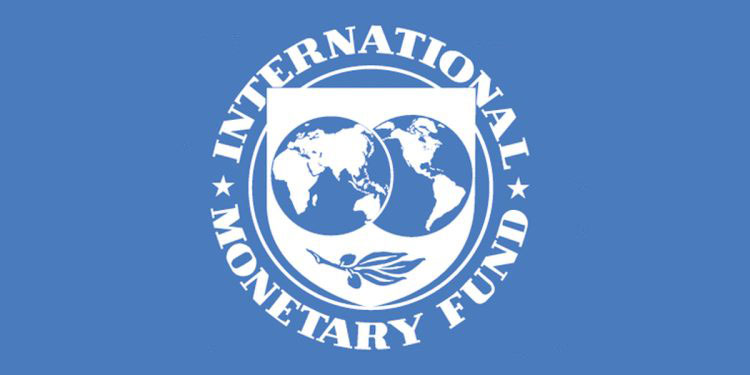
Sri Lanka’s economy has “stabilised decisively” under its International Monetary Fund (IMF)-supported programme, with growth rebounding, tax revenues doubling, and inflation sharply declining, a senior IMF official said in Colombo yesterday.
Dr. Krishna Srinivasan, Director of the IMF’s Asia and Pacific Department, delivered the assessment during a public lecture on the IMF Regional Economic Outlook: Asia and Pacific, held at the Central Bank of Sri Lanka. He was joined by Dr. Thomas Helbling, the Department’s Country Director.
Both officials commended the Asia-Pacific (APAC) region’s overall economic resilience in the face of global challenges and advocated for deeper trade and supply chain integration to mitigate vulnerabilities in international trade.
Presenting a country-focused analysis, Dr. Srinivasan outlined how Sri Lanka has performed against the five key pillars of the IMF programme:
Revenue-based fiscal consolidation, supported by tax reforms and strengthened social safety nets.
Restoring debt sustainability through fiscal adjustment and debt restructuring.
Maintaining price stability and rebuilding foreign exchange reserves.
Safeguarding external stability.
Combating corruption via a comprehensive anti-corruption reform agenda.
“Sri Lanka has come out of the crisis stabilising its economy across three dimensions,” Dr. Srinivasan stated referring to Sri Lanka’s Growth, Revenue, and Inflation. He highlighted that growth “bounced back decisively,” turning positive within six months of the programme and recently averaging about 5 percent annually.
On fiscal performance, he noted a “significant turnaround.” Tax revenue has doubled from a critically low 7.3 percent of GDP to 14.8 percent in 2025.
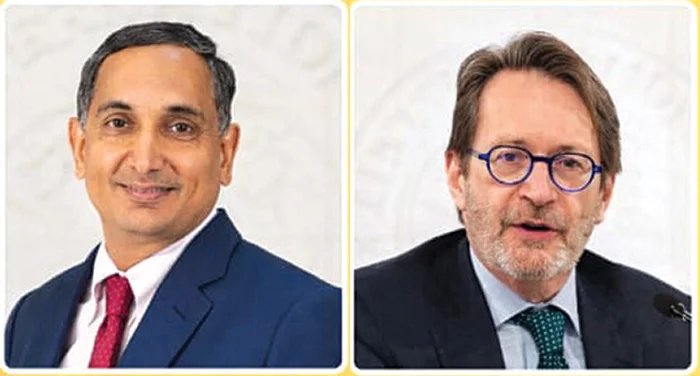
Dr. Krishna Srinivasan / Dr. Thomas Helbling
Furthermore, inflation has dropped “in a very convincing manner” from approximately 70 percent to the current 2-3 percent range. “One would hope that in the next few quarters, it will reach the Central Bank’s target of 5 percent,” he added.
“Overall, the IMF programme for Sri Lanka has delivered on many of its objectives,” Dr. Srinivasan concluded. “There is still a long way to go in terms of securing strong, sustained, balanced growth, but the program is off to a very good start. All of you, the authorities, and the people of Sri Lanka need to be congratulated for the progress made so far,” he said.
In his regional remarks, Dr. Srinivasan projected that Artificial Intelligence (AI) will be a key driver of the Asian economy. He suggested that technology companies in the region would be “better served by the capital markets than from conventional banks,” pointing to a need for evolved financial ecosystems to support innovation.
The lecture underscored the IMF’s constructive outlook for Asia’s continued resilience, while emphasising structural reforms and regional cooperation as vital for future stability and growth.
By Sanath Nanayakkare
News
ICT, WNPS unite to protect sea turtles along Colombo coast

Colombo International Container Terminals (CICT) has entered into a three-year partnership (2025–2028) with the Wildlife and Nature Protection Society (WNPS) under the Turtle and Coastal Health United Programme (TACHUP) to protect sea turtles and restore coastal ecosystems along the Colombo Port City–Mount Lavinia coastline.
Sri Lanka is home to five of the world’s seven sea turtle species, all of which nest along this highly urbanised stretch of coastline. The initiative will focus on safeguarding turtle nesting and hatchling success, restoring coastal vegetation, strengthening citizen science and data collection, and engaging local communities, schools, and volunteers in long-term conservation efforts.
The project builds on ongoing conservation work that has already recorded more than 680 turtle visits in a single nesting season and protected over 15,900 eggs with hatching success rates exceeding 80 per cent.
Commenting on the partnership, CICT CEO Jan Zhang said, “As a gateway to global trade, CICT recognises its responsibility to protect the environment that surrounds us. This partnership with WNPS is an investment in long-term ecological resilience, biodiversity conservation, and responsible stewardship of Sri Lanka’s coastal heritage.”
The collaboration enhances Colombo’s global standing as an accredited Ramsar Wetland City and reflects CICT’s continued commitment to sustainability, environmental protection, and responsible port operations.
-

 Business3 days ago
Business3 days agoComBank, UnionPay launch SplendorPlus Card for travelers to China
-

 Business4 days ago
Business4 days agoComBank advances ForwardTogether agenda with event on sustainable business transformation
-

 Opinion4 days ago
Opinion4 days agoConference “Microfinance and Credit Regulatory Authority Bill: Neither Here, Nor There”
-

 Opinion6 days ago
Opinion6 days agoA puppet show?
-

 Opinion3 days ago
Opinion3 days agoLuck knocks at your door every day
-
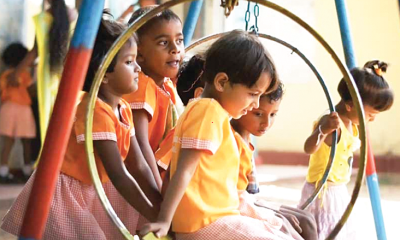
 Features6 days ago
Features6 days ago‘Building Blocks’ of early childhood education: Some reflections
-

 Business5 days ago
Business5 days agoDialog Brings the ICC Men’s T20 Cricket World Cup 2026 Closer to Sri Lankans
-
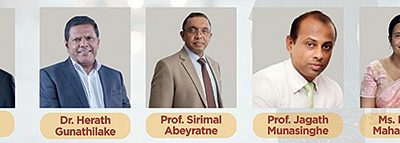
 News4 days ago
News4 days agoRising climate risks and poverty in focus at CEPA policy panel tomorrow at Open University













